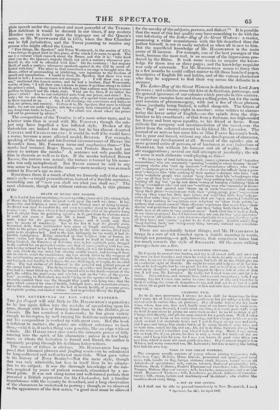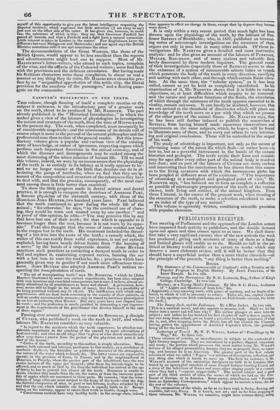THE LETTER -DAG Or THE GREAT WESTERN.
TUTS JO( treVrit Will add little to Mr. HAL:BURTON'S reputation ; for he has again fallen into the mistake of speculating upon his Hanle, though with less of literary fraud than in the Bubble:from emoula. Ile has contrived 'a framework ; he has given variety enough to his topics, by well varying Isis fictitious correspondents; and his composition is worked up with great care. But the book is deficient in matter ; the points tire without substance to back them,—which is, if such a thing were possible, like an edge without a blade. Mr. 11Amm-wroN also wants the dramatic power of fully entering into the spirit of his characters : unless in a few lucky eases, or where the imitation is forced and literal, the author is constantly peeping, through his fictitious letter-writes-8. Tile source of failure is obvious. .2%1E. 11.tmilutaoN has sup- posed that labowed phrases and jingling words can be substituted for long-collected and well-selected matcrials. What gave value to his history of Nova Scotia 'f—Not the mere style, though that Was very admirable, but less in itself than in its adapta- tion to its subject. It was the thorough knowledge of the sub- ject, acquired by years of patient research, stimulated by a na- tional pride. It was not slang terms and well-turned periods that procured a British reputation fig his Chu:hawker, but a familiar acquaintance with the country be described, and a long observation of the characters he undertook to portray ; though, as we observed ou the appearance of the first series, "a good deal must be allowed for the novelty of the subjects, persons, and dialect."'" It is possible that the want of this last. quality may have something to do with the vast inferiority of the Letter-Bag of the Great Western : a reader, possessing a wider acquaintance with the life described than the author himself, is not so easily satisfied as when all is new to him. But the superficial knowledge of Mr. IIALIBURTON is the main cause of ill success. For example, one of the best passages of the book, because the most real, is an account of the impressions pro- duced by the Rhine. It took some weeks to acquire the know- ledge for those two or three pages ; and the knowledge requisite was only of externals. Yet Mr. IlmanuaToN seems to fancy that in a few months he could collect matter to fill three hundred pages, descriptive of English life and habits, and of the various characters who may be supposed to find their way across the Atlantic in a steamer.
The Letter-Bag of the Great Western is dedicated to Lord Join/ RUSSELL ; and contains some fair hits at dedications, patronage, and the general ignorance of our colonies which prevails in this country. The preface contains here and there a telling point, but for the most part consists of pbrasemonffery, with not a few of those phrases, whose jocularity being limited, is called slang-wit. The letters of the " Bag" are twenty-eight in number : some written to charac- terize the lower order of English,—as the epistle from the ship- butcher to his sweetheart ; or that from a footman, too high-souled for livery and bent upon equality, to his friend at home. Some ridicule the company and accommodation of the vessel,—as the letter from the coloured steward to his friend Mr. Lavender. The journal of au actress has sonic hits at Miss FANNY REM 111.E'S book, but is poor and forced, without ally like development of character, or rather any development at all. Several of the epithet aiin at
more general satire of persons, or of landsnien at sea : imitations of
ALtanirAT, but without his humour and air of reality. Several are exaggerations • several are dull attenipts at jocularity ; the wit of some is such elaborate' word-playing as this- " We have lots of land-lubhers on board, young agitators fond of intestine commotions,' who are constantly 'spouting ''—inaidens mm hue bosoms 'heave' —young clerks who 'cast up accounts '—Custoinbou.e officers who • clear out '—sliarpers given to ' overreaching '—.Tews who at the Wilson' keep a pass- over '—lawyers who "take nothing by their motion '—doctors whn have sick visits '—choleric people who cannot 'keep down their bile '—bimkrupts who ' give imp all they have '—spendthrifts who keep nothing long '—idlers who do nothing all day but up and down '—inen of business exhibit if ;g ' bills of lading '—swindlers who' cut and run '—military men who surrender at discre- tion '—boys that quarrel and ' throw up at cards '—servants that cannot 'keep their places —auctioneers whit thew 'going, going, gone I'—yreachera who say they want but little here below, nor want -that little long '—hypo- crites that make 'long finses '—grumhlers that are 'open monthol'—halthlers that 'keep nothing in '—painters ever reluctant to 'show their palette '— authors that cannot conceal their effusions '—printers that never leave their sheets,' and publishers that first 'puff ' and then bring forth their trash.' la short, men ot. all sorts in 'one common mess.' Lord, What fun it is, dcar Jack, to see these creatures! Cool Christians they are too, for they 'give and take;' they 'return ' all kindness with interest—charitable to a degree, fix thee ,give all they have,' and strain ' a point to do their utmost. Candiil song: they 'keep nothing back,' but bring every thing forward,' without any comaera- don for themselves."
There are occasionally better things; and Mr. IIALinewrox is happy in a sort of wit founded upon a double meaning in words, though not punning,—a gift, however, that sometimes takes him WO much towards the style of SMOLLETT. Of the more striking passages here are a few.
TROUBLES or A coLocrmo STEWARD.
De Captain he man-o'-war buckra, and dey is all cussed stiff, and most too big men the dere breeches, and when Ise walky de deck, he only sec de stars and de sun; he no see de ship and de passenger, but leab all to me, which give me an everlast in' sight of trouble. He °mita to come and help ine at de Isar his- self, so he limit ought, but he too proud tin dat, and so is ell don what has de swab on de shoulder ; and proper hard harpist de queen hab of some of dem too, I tell you, Mr. Labender. By Cully, but I must ware out, oust dat is de truth. Steward here, and steward dere, ;Ind swward ehery where ; well, I say coming, Sir, but I takes care licher to come to none at all ; and wisest (ley is tired of calling, tley come ob deniselves to me, anii find out to de last it would be cher; bit as good for em to hab conic at fu,..t and sabe dew wind to cool dere soup wid.
c nANGING WIrE.
As to de amen passengers, I always let dem shift for demselves, for dere isn't werry few of dem is real superfine gentles's:it, but jist refidge a leetle var- nished over de surtiwe like, all pretence. Dev all make believe dist (ley know wine, when, dam um, dere isn't hardly DOM; Of 011 liDOw him by name even. One lineera says, Steward, I can't drink dis wine, it is werry poor stuff; ‘vhat de debit do you mean by giving me such trash muss. ills he no lit to drink it all! Change Ishii directly, :Oa gib toe some dat is lit for a gentleman. AVell, I takes up de wine, and looks at um wary knowing, and dot whisper in his ear not to speak so loud lest eberybody hear ; and I put de ting.as on my suss,. and node, and I goes and brings him :moiler limit! le of de wary identical smite wine, and he taste him, smack Isis lip, and say, A.11, slat is de wine, Steward, always twilit; me dat wine, and I remember you when I Lab de shill. II usb. say, massa, not so loud, Sir, if you please, dere is only a werre few bottles of dat are wine, and I keep him fur you, for I see s you knows the good wine when volt Dey is cussed stupid dens sees him, which is more nor most gentlemen does. White's, and %verve conceited too, -Mr. Labender ; but dere is noting like letting hint hab his own way.
TALK IN TILE GREAT WESTERN.
The company usually consists of young officers joining regiments; talk, C arra It is r, 'ape, hlahihlix, llorse Guards, promotion and spoil ...;—of naval. men ; talk, insults to flag, foreign stations, crack frigates. miuuii t stenis, old Admiral—or speculators; talk, cotton, tobacco, dour—of provincials talk, Durham, Ilead, Colborne, Poulett Thomson—of travellers ; Niagara, Mahone Bay—or W01111211; talk, headache, amusements, and son!qinse about Byron—of Yankees ; talk, Locollwo's, go-ahead, dollars—of mannflic- turers ; talk, steam, thetors and macliinery—ot bleckheml:, who chatter like munkies about every thing. A lilT AT THE °met. • As I shall not be able to proceed immediately to New Brunswick, I aval
• Spectator, No. 457 ; 1st April 1837.
myself of this opportunity to give you the latest intelligence respecting the disputed territory, which engrosses but little attention (I am sorry to say) just now on the other side of the water. It has given rise, however, to much fun, the substance of which is this : they say that Governor Fairfield has passed all bounds, and that a Fairfield and a fight have a natural connexion. Little interest is taken in London in the matter. Few Englishmen know the difference between Madagascar and Madawaska; and our agent says the British Minister sometimes calls it one apd sometimes the other.
The iiccommodations of the Great Western, like those of the British Queen, would appear to be less excellent than the reports and advertisements might lead one to suppose. Most of Mr. HmanuaToses letter-writers, who attend to such topics, complain of the wine, and the effluvia of the Coloured waiters ; some find fault with the provisions and the deficient attendance. But having made his fictitious characters write these complaints, in about as real a manner as any thing they do write, Mr. HALIBURTON closes his pre- face by an "unqualified approbation of this noble ship, the liberal provision for the comforts of the passengers," and a flaming pane- gyric on the commander.



























 Previous page
Previous page